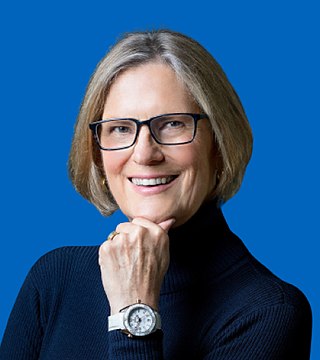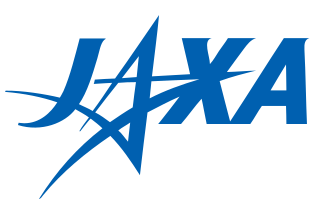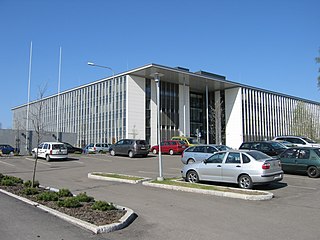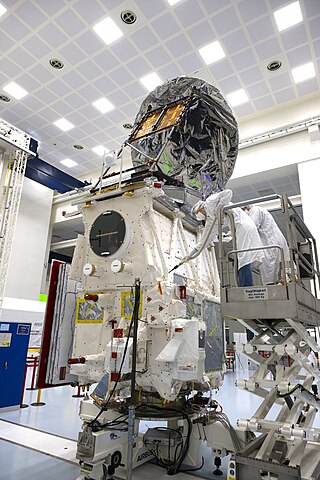Related Research Articles

Kathryn Dwyer Sullivan is an American geologist, oceanographer, and former NASA astronaut and US Navy officer. She was a crew member on three Space Shuttle missions.

The Japan Aerospace Exploration Agency (JAXA) is the Japanese national air and space agency. Through the merger of three previously independent organizations, JAXA was formed on 1 October 2003. JAXA is responsible for research, technology development and launch of satellites into orbit, and is involved in many more advanced missions such as asteroid exploration and possible human exploration of the Moon. Its motto is One JAXA and its corporate slogan is Explore to Realize.

The Italian Space Agency is a government agency established in 1988 to fund, regulate and coordinate space exploration activities in Italy. The agency cooperates with numerous national and international entities who are active in aerospace research and technology.

The Finnish Meteorological Institute is the government agency responsible for gathering and reporting weather data and forecasts in Finland. It is a part of the Ministry of Transport and Communications but it operates semi-autonomously.
Surrey Satellite Technology Ltd, or SSTL, is a company involved in the manufacture and operation of small satellites. A spin-off company of the University of Surrey, it is presently wholly owned by Airbus Defence and Space.

Aeolus, or, in full, Atmospheric Dynamics Mission-Aeolus (ADM-Aeolus), was an Earth observation satellite operated by the European Space Agency (ESA). It was built by Airbus Defence and Space, launched on 22 August 2018, and operated until it was deorbited and re-entered the atmosphere over Antarctica on 28 July 2023. ADM-Aeolus was the first satellite with equipment capable of performing global wind-component-profile observation and provided much-needed information to improve weather forecasting. Aeolus was the first satellite capable of observing what the winds are doing on Earth, from the surface of the planet and into the stratosphere 30 km high.

TerraSAR-X is an imaging radar Earth observation satellite, a joint venture being carried out under a public-private-partnership between the German Aerospace Center (DLR) and EADS Astrium. The exclusive commercial exploitation rights are held by the geo-information service provider Astrium. TerraSAR-X was launched on 15 June 2007 and has been in operational service since January 2008. With its twin satellite TanDEM-X, launched 21 June 2010, TerraSAR-X acquires the data basis for the WorldDEM, the worldwide and homogeneous DEM available from 2014.

The following outline is provided as an overview of and topical guide to space exploration.
Astrium was CORRECTION(there's no was it's was and still is for now at least) an aerospace manufacturer subsidiary of the European Aeronautic Defence and Space Company (EADS) that provided civil and military space systems and services from 2006 to 2013. In 2012, Astrium had a turnover of €5.8 billion and 18,000 employees in France, Germany, the United Kingdom, Spain and the Netherlands. Astrium was a member of Institute of Space, its Applications and Technologies.
THEOS, also known as Thaichote, is an Earth observation mission of Thailand, developed at EADS Astrium SAS, Toulouse, France. In July 2004, EADS Astrium SAS signed a contract for delivery of THEOS with GISTDA of Bangkok, Thailand. GISTDA is Thailand's leading national organization in the field of space activities and applications. The Thai Ministry of Science and Technology funds the program.
The European Data Relay System (EDRS) system is a European constellation of GEO satellites that relay information and data between satellites, spacecraft, UAVs, and ground stations. The first components were launched in 2016 and 2019.

EarthCARE, nicknamed Hakuryū, is a joint European/Japanese satellite, the sixth of ESA's Earth Explorer Programme. The main goal of the mission is the observation and characterization of clouds and aerosols as well as measuring the reflected solar radiation and the infrared radiation emitted from Earth's surface and atmosphere.

TanDEM-X is the name of TerraSAR-X's twin satellite, a German Earth observation satellite using SAR - a modern radar imaging technology. Implemented in a Public-Private-Partnership between the German Aerospace centre (DLR) and EADS Astrium, it is a second, almost identical spacecraft to TerraSAR-X (TSX). TanDEM-X (TDX) is also the name of the satellite mission flying the two satellites in a closely controlled formation with typical distances between 250 and 500 m. The twin satellite constellation allowed the generation of WorldDEM global digital elevation models starting in 2014.

The Mohammed Bin Rashid Space Center "MBRSC is a Dubai Government organization working on the UAE space program, which includes various space satellites projects, such as the Emirates Mars Mission, the Emirates Lunar Mission, and the UAE astronaut program. The center actively works to promote space science and research in the region and encompasses the Emirates Institution for Advanced Science and Technology (EIAST).
SEOSat-Ingenio, was a Spanish project to produce a satellite capable of providing wide-field imagery ensuring a repeat cycle of 38 days at 2.5 metre panchromatic resolution and 10 metre colour resolution, from a Sun-synchronous polar orbit; it was Spain's first optical imaging satellite. The satellite was part of the Spanish Earth Observation Satellite program. The mission was funded by Spain's Centre for the Development of Industrial Technology (CDTI). SEOSat-Ingenio information was to be used by various Spanish civil, institutional or government users. However, under the Copernicus Programme of the European Union, it was also accessible to other European users, as well as to the Group on Earth observation of the Global Observing System of Earth.
Airbus Defence and Space is a division of Airbus SE. Formed in 2014 in the restructuring of European Aeronautic Defence and Space (EADS), Airbus SE comprises the former Airbus Military, Astrium, and Cassidian divisions. Contributing 21% of Airbus revenues in 2016, it is the second largest space company in the world.

Sentinel-5 Precursor (Sentinel-5P) is an Earth observation satellite developed by ESA as part of the Copernicus Programme to close the gap in continuity of observations between Envisat and Sentinel-5. It was launched in October 2017, and has a design life of 7 years. The TROPOspheric Monitoring Instrument (Tropomi) provides the most detailed methane emissions monitoring available.
The National Space Program (PSN) horizons 2020 planned to put in place space infrastructures, and space systems and increase the specialized human resources in space technologies. Among the space systems planned in the PSN are Algeria's satellites, of which a significant number should be partly or totally integrated into the Algerian center for satellite development "CDS". CDS offers the technological environment for national competence to develop the future Algerian satellite systems. Algeria's objective is to make space tools a powerful instrument in national prosperity in the fields of earth observation, meteorology and communications.

As the space race came to an end, a new rationale for investment in space exploration emerged, focused on the pragmatic use of space for improving life on Earth. The legacy of the space race is that nations continue to pursue space exploration to enhance their prestige. As the justification for government-funded space programs shifted to "the public good", space agencies began to articulate and measure the wider socio-economic benefits that might derive from their activities, including both the direct and indirect benefits of space exploration. However, such programs have also been criticized with several drawbacks cited.
References
- 1 2 3 4 5 6 Al-Khalili, Jim. "Liz Seward and the dream of spaceflight". The Life Scientific. BBC. Retrieved 3 June 2020.
- ↑ Whiteside, Philip (4 November 2018). "Life on Mars? Work starts on British-built robot to explore Red Planet". SkyNews. Retrieved 8 June 2020.
- 1 2 3 4 "Liz Seward". International Astronautical Federation. Retrieved 31 May 2020.
- ↑ Stew, Martin. "Deadly air pollution seen from space". ITV News. Retrieved 8 June 2020.
- ↑ "Into the Unknown: what is the future of space exploration?". Institute of Art and Ideas. Retrieved 16 June 2020.
- 1 2 "Rising Stars Winners 2019". WeAreTheCity. Retrieved 8 June 2020.